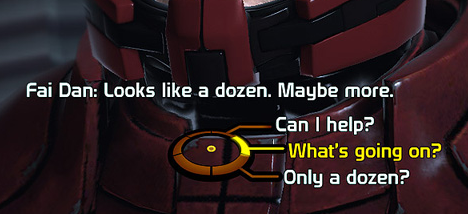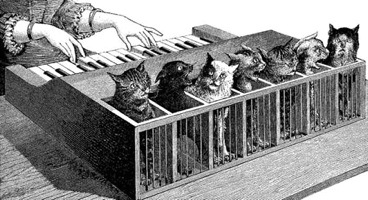As part of the run-up and subsequent write-up of my talk on Mass Effect, I've been doing a lot of thinking on the relationship between gaming, narrative, and the status of the "player character." I just read a
great post by Greg Rucka on Mass Effect 2, and it hits on so much of what I've been mulling over, and what's currently keeping the Mass Effect series from jumping the barrier between an excellent game and a great work.
First, consider the dialog-wheel. The
dialog system is not just a handy way to handle choice structures on an xbox controller, it also expands your storytelling capacity. By selecting only the general gist of your response, and letting your fully voiced Shepard speak for him/herself, you get much more immersive conversations. Longer speeches and exchanges can be made, Shepard can reveal details about the world or his/her background that the player wasn't party to, or shoot an uncooperative criminal in the face. (It makes it a lot easier to be a jerk, as well.) You cede some of your direct control over the character in order to create a more interesting experience. So, while you can decide some of the parameters of Shepard's backstory and psych profile, and you can make the decisions that Shepard takes, there's a slight remove between you and "your" Shepard.
But, and this is what Rucka's analysis really brings out, once you cede any amount of control to the designer/storyteller "
the onus is on the storyteller and not the player to fulfill the demands of the character’s journey." And I wish they did more towards that end. Shepard is, perhaps necessarily, the least-defined member of the Normandy's crew. Lots of people will have lots of impressions of what their Shepard will say and do. What the voice actors do is already amazing if you think about all the different variables they're juggling. So I can understand the lack of customized dialog for and reacting to the different choices and personalities you make. But that's not an excuse.
Mass Effect drives me up the theoretical wall because there are so many things it does so well, it makes us wish it could do the rest, and finally give us something that we could put up on the mantelpiece and point to when asked about why we game. It raises so much potential, so many possibilities, sets our minds racing about the possible ethical quandaries we could be faced with until we realize sadly that, no, the game doesn't actually figure that in. A lot of issues that initially seemed very important were basically hand-waved once you're given a ship and bad guys to point it at. You get precious few chances to express what's really going on with your character.
 In 1906 the New York Times recorded the old salt's reaction when shown the teleharmonium, my personal favorite when it comes to electromechanical musical instruments weighing 200 tons or more. Twain remarked that
In 1906 the New York Times recorded the old salt's reaction when shown the teleharmonium, my personal favorite when it comes to electromechanical musical instruments weighing 200 tons or more. Twain remarked that










